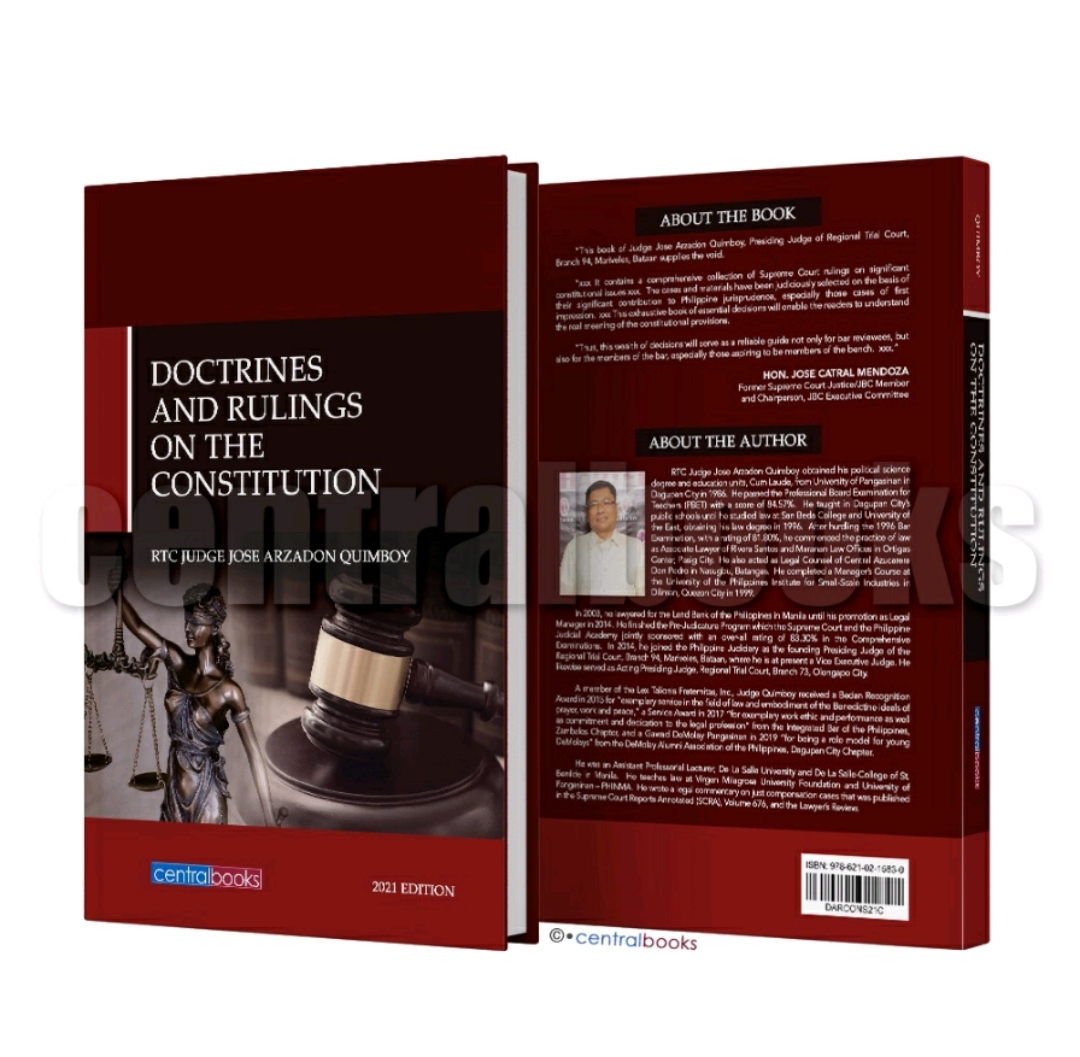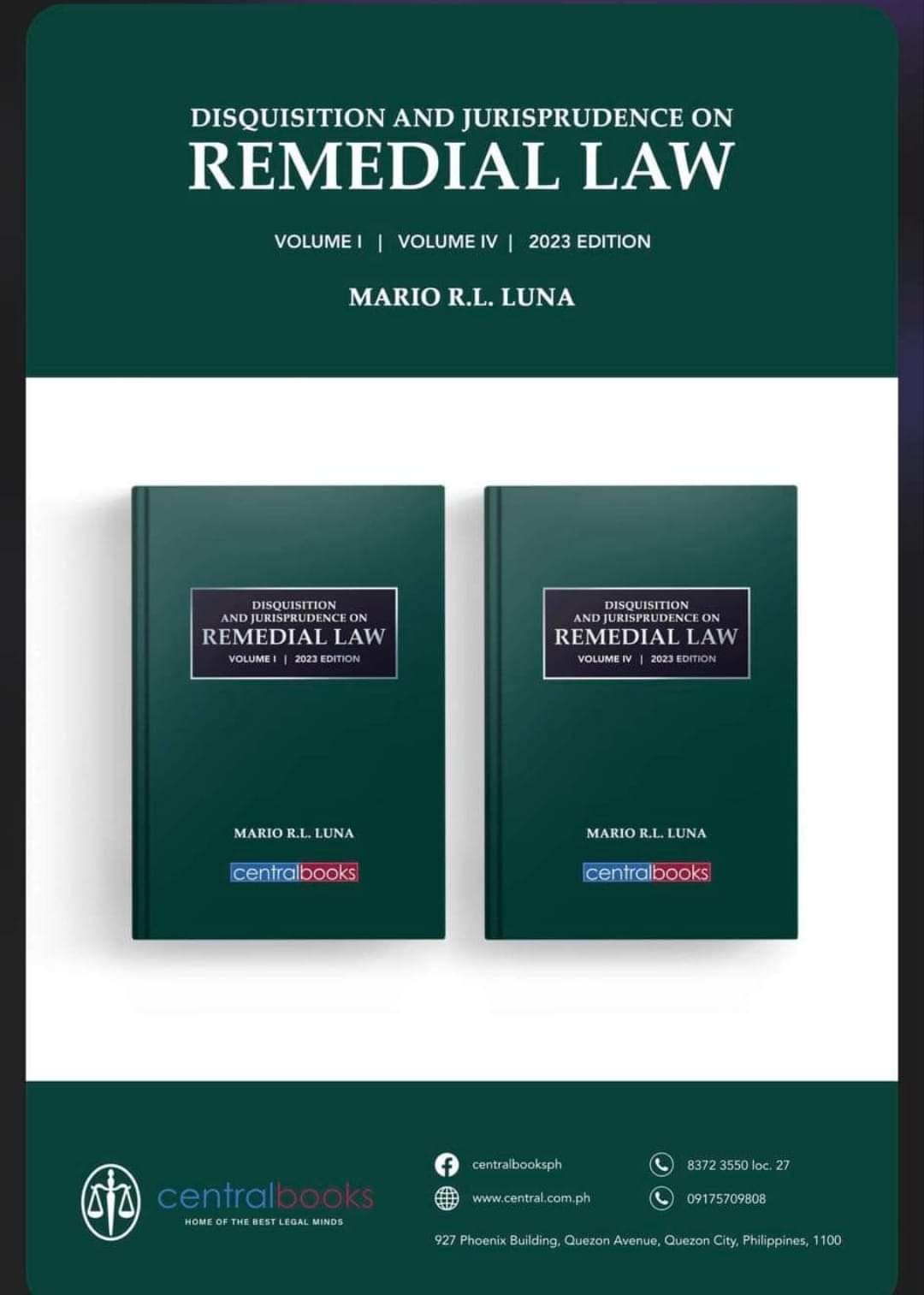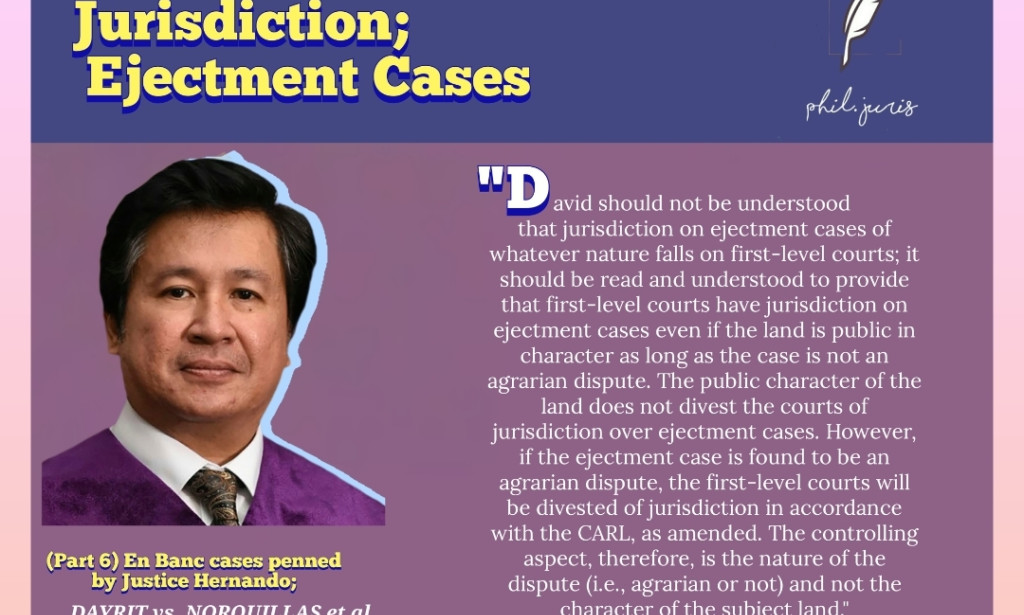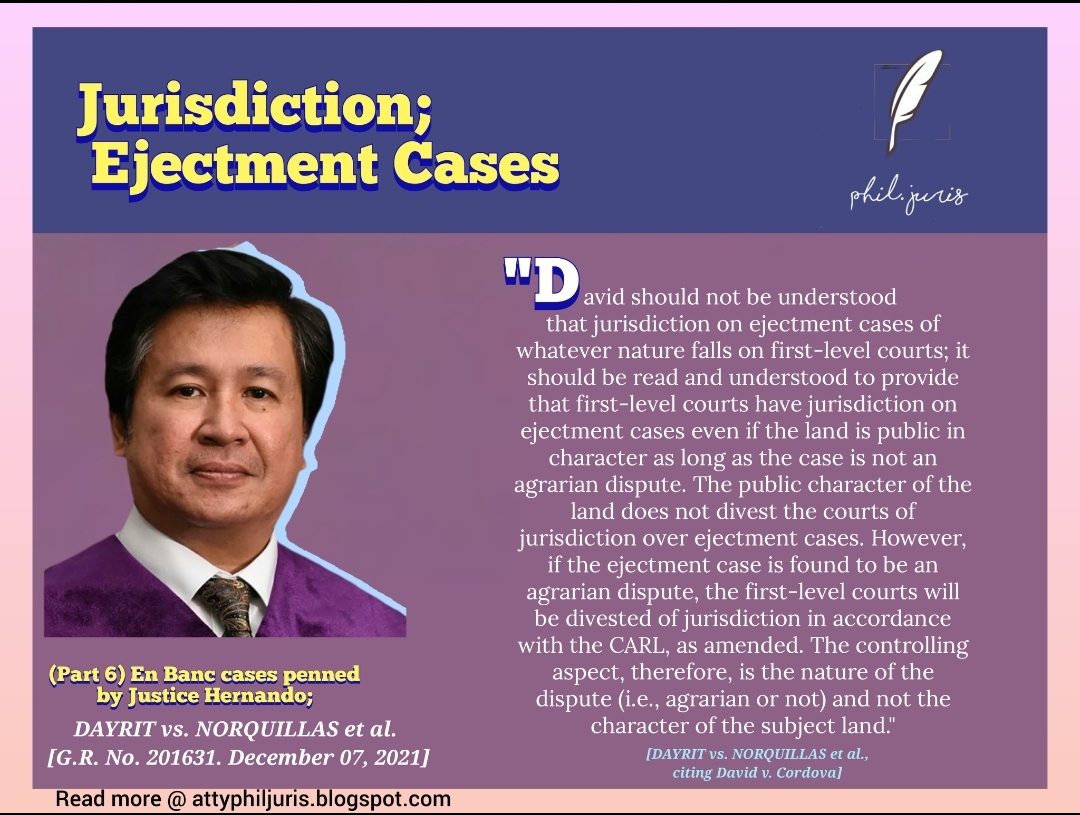Jurisdiction is the power and authority of a court or a tribunal to hear, try, and decide a case before it. A judgment rendered by a body without jurisdiction is void and may be attacked any time. It is settled that jurisdiction over the subject matter is conferred by law and determined by the allegations in the complaint, including the character of the reliefs prayed for.
In contention here is the conflict of jurisdiction between the MCTC and the DARAB. Angelina maintains that the MCTC has jurisdiction over the instant complaint for forcible entry, while respondents maintain that the DARAB has jurisdiction as the action is considered as an agrarian dispute stemming from the enforcement of the CLOAs issued to them.
The Court takes this opportunity to clarify this seeming overlap.
Simply scroll down to continue reading this article...
 Doctrines and Rulings on the Constitution (2021) by RTC Judge Jose Arzadon Quimboy
Doctrines and Rulings on the Constitution (2021) by RTC Judge Jose Arzadon Quimboy
SHOP HERE!
🛒 SHP: https://go.shopple.co/spmomu
🛒LZD: https://s.lazada.com.ph/s.6j3Iq?cc

(Audible and ebooks in CD's) The Tools of Argument: How the Best Lawyers Think, Argue, and Win
SHOP HERE!
🛒 LZD: https://go.shopple.co/spmo6e
🛒 SHP: https://go.shopple.co/spmo6f

Luna (2023) Rem Vol. 1 - Civil Procedure - Disquisition and Jurisprudence on Remedial Law - by Mario
🛒 Shop HERE:
LZD: https://go.shopple.co/spmn1n
SHP: https://go.shopple.co/spmn1k
"The series that made thousands of lawyers."
 ♚✙☏Miracle Shining Round Black Badge Collar Pin Justice Scale Pattern Men Women Shirt Brooch
♚✙☏Miracle Shining Round Black Badge Collar Pin Justice Scale Pattern Men Women Shirt Brooch
LZD: https://go.shopple.co/spmmu5
SPH: https://go.shopple.co/spmmuu

Law Bookmark - 1pc Original The Legal Stuff design magnetic glitter/matte bookmark
LZD 🛒Shop here: https://go.shopple.co/splg7a
SHP 🛒 Shop here: https://go.shopple.co/splg7e
 |
| Lawyer In Progress - Law School Student Graduation Lawyer T-SHIRT [NEW LIMITED!] |
Law School Student Graduation Lawyer T-SHIRT [NEW LIMITED!]
🛒 LZD: https://go.shopple.co/splfr6
🛒 SHP: https://go.shopple.co/splfr8

Parker Vector Ballpoint Pen Gift Set ( Ink Color-Blue)
🛒LZD: Shop here: https://go.shopple.co/spld8t
Continue reading...
Clarifying the jurisdiction of
DARAB in relation to
possessory and ejectment
actions involving agricultural lands. [Read attachment]
Continue reading...
As can be gleaned from these laws, the MCTC has exclusive original jurisdiction over cases of forcible entry, while the DARAB has primary jurisdiction over agrarian disputes. An agrarian dispute refers to any controversy relating to, as related to the instant case, tenancy over lands devoted to agriculture and transfer of ownership from landowner to farmworkers, tenants, and other agrarian reform beneficiaries. The amended CARL adds that the judge or prosecutor shall automatically refer the case to the DAR if there is an allegation from any of the parties that the case is agrarian in nature, and one of the parties is a farmer, farmworker or tenant.
… “the public character of the land does not preclude inferior courts from exercising jurisdiction over forcible entry cases.” (End of emphasis).
Robles v. Zambales Chromite Mining Co., et al.
… “the land spoken of in Section 1, Rule 70 of the Rules of Court includes all kinds of land, whether agricultural or mineral. It is a well known maxim in statutory construction that where the law does not distinguish, we should not distinguish.” (End of emphasis).
Moreover, ejectment proceedings are summary proceedings only intended to provide an expeditious means of protecting actual possession or right to possession of property. Title is not involved. The sole issue to be resolved is the question as to who is entitled to the physical or material possession of the premises or possession de facto.
Pajuyo v. Court of Appeals illustrates this point, thus:
“The only question that the courts must resolve in ejectment proceedings is — who is entitled to the physical possession of the premises, that is, to the possession de facto and not to the possession de jure. It does not even matter if a party's title to the property is questionable, or when both parties intruded into public land and their applications to own the land have yet to be approved by the proper government agency. Regardless of the actual condition of the title to the property, the party in peaceable quiet possession shall not be thrown out by a strong hand, violence or terror.”
“Neither is the unlawful withholding of property allowed. Courts will always uphold respect for prior possession.
Thus, a party who can prove prior possession can recover such possession even against the owner himself. Whatever may be the character of his possession, if he has in his favor prior possession in time, he has the security that entitles him to remain on the property until a person with a better right lawfully ejects him. To repeat, the only issue that the court has to settle in an ejectment suit is the right to physical possession.” (End of emphasis).
… “in this case, the government owned the land in dispute. The government did not authorize either the plaintiff or the defendant in the forcible entry case to occupy the land. Both parties were in effect squatting on government property. Yet we upheld the court's jurisdiction to resolve the issue of possession even if title remained with the government.” (End of emphasis).
Courts must not abdicate their jurisdiction to resolve the issue of physical possession because of the public need to preserve the basic policy behind the summary actions of forcible entry and unlawful detainer. The underlying philosophy behind ejectment suits is to prevent breach of peace and criminal disorder and to compel the party out of possession to respect and resort to the law alone to obtain what he claims is his. The party deprived of possession must not take the law into his own hands. Ejectment proceedings are summary in nature so the authorities can settle speedily actions to recover possession because of the overriding need to quell social disturbances.
Thus, the better rule is that even while the power of administration and disposition of public or private agricultural lands belongs to DAR, courts retain jurisdiction over actions for forcible entry involving such lands. To restate this, courts have jurisdiction over possessory actions involving public or private agricultural lands to determine the issue of physical possession as this issue is independent of the question of disposition and alienation of such lands which should be threshed out in DAR.
TAKE NOTE [MUST READ]
TAKE NOTE:
Chailese Development Company, Inc. v. Dizon (Chailese), which clarifies the jurisdiction of the DARAB over agrarian disputes.
“RA 9700 reinforced the jurisdiction of DAR as already provided in the original CARL. It made clear the requisites for a case to be considered to be an agrarian dispute. It also mandated the automatic referral upon concurrence of the requisites. In Chailese, the Court retroactively applied RA 9700 to the case and ruled that the RTC has jurisdiction over the possessory action due to absence of evidence on the existence of a tenancy relation, thus failing to satisfy the second requisite.”
“Based on the foregoing, David and Chailese can be viewed as guides for the courts in tackling ejectment and possessory actions allegedly involving agrarian disputes. David instructs that not all ejectment cases are cognizable by the first-level courts - those involving agrarian disputes are not cognizable by the first-level courts. In this relation, Chailese clarifies the requisites for an agrarian dispute, and highlights the mandate of the amendatory law of automatic referral of cases involving agrarian disputes to the DAR.”
Based on the said provision, the judge or prosecutor is obligated to automatically refer the cases pending before it to the DAR when the following requisites are present:
a. There is an allegation from any one or both of the parties that the case is agrarian in nature; and
b. One of the parties is a farmer, farmworker, or tenant.
Retroactive application
of RA 9700 and Chailese on
cases before first-level
courts
Chailese further provides for the retroactive application of Section 50-A of RA 9700:
In this regard, it must be said that there is no merit in the contention of petitioner that the amendment introduced by R.A. No. 9700 cannot be applied retroactively in the case at bar. Primarily, a cursory reading of the provision readily reveals that Section 19 of R.A. No. 9700 merely highlighted the exclusive jurisdiction of the DAR to rule on agrarian cases by adding a clause which mandates the automatic referral of cases upon the existence of the requisites therein stated. Simply, R.A. No. 9700 does not deviate but merely reinforced the jurisdiction of the DAR set forth under Section 50 of R.A. No. 6657. Moreover, in the absence of any stipulation to the contrary, as the amendment is essentially procedural in nature it is deemed to apply to all actions pending and undetermined at the time of its passage.
Thus, the Court can apply RA 9700 to the instant case.
Application to the instant case.
Guided by David and Chailese, the Court now resolves the instant case. (Read attachment below).
READ full summary here:
https://pastepeso.com/7alsdcihh
FOLLOW US!
Phil Juris | Website:





You must be logged in to post a comment.